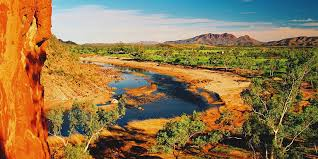I have spent most of the day trying to decide what the topic of today’s
post would be, and I ended up picking the town of Alice Springs.
Aussies commonly refer to Alice Springs as "The Alice"
or simply "Alice".
This is one town I would like to visit one day my parents visited
the Alice and enjoyed the visit, I do remember mum & dad telling me that
when the bought wine from a bottle shop, they were told to make sure it was
covered so it couldn’t be seen by looking in a window and to get in their car
and drive to a different area. This was because some of the local aboriginals
would break into the car if they saw grog inside and if they were seen placing alcohol
in the car and walking away the car would be broken into.
Alice Springs is a remote town in Australia’s Northern
Territory, halfway between Darwin and Adelaide, both 1,500km away. It’s a
popular gateway for exploring the Red Centre, the country's interior desert
region. Its 1872 origin as part of the Overland Telegraph Line (linking Darwin
and Adelaide) is preserved in the vintage buildings and equipment at the Alice
Springs Telegraph Station Historical Reserve.
It has an estimated population of around 28,922. This is based on the Alice Springs Town Council LGA profile, which was last updated in January 2025. The town is the major settlement in Central Australia and a significant population centre in the Northern Territory.
The population of Alice Springs is an estimate because it
is based on projections and statistical modelling rather than a direct head
count. The Australian Bureau of Statistics (ABS) uses various methods,
including census data and estimated resident population (ERP) figures, to
calculate population numbers, but these are subject to revision and may not perfectly
reflect the actual population at any given time, especially in smaller areas
like Alice Springs.
Alice Springs was established in 1872 with the
construction of the Alice Springs Telegraph Station, part of the Australian
Overland Telegraph Line (OTL) connecting Adelaide to Darwin. It was
originally named Stuart, but the settlement near the telegraph station was
later renamed Alice Springs in 1933. The name Alice Springs was given by
W.W. Mills, after Alice Todd, wife of Sir Charles Todd, who was
instrumental in the construction of the telegraph line.
The Arrernte people are the traditional owners and
custodians of Alice Springs, also known as Mparntwe in the Arrernte
language. They have a deep and enduring connection to the land, dating
back tens of thousands of years. The Arrernte have stories and significant
sites related to the creation of the landscape, including the MacDonnell Ranges.
Alice Springs is famous for its unique location in the heart of Australia, its strong Aboriginal culture and art scene, and its stunning natural landscapes, including the MacDonnell Ranges. It's also known as a hub for exploring the broader Red Centre region and for its outback character.
Alice Springs faces a complex combination of social and
crime-related issues that contribute to a perception of danger. These
include high rates of alcohol-related violence, property crime, and domestic
violence, along with concerns about youth crime and the impact of past
policies. While the town has a diverse population and attracts tourists,
these issues have led to increased fear and anxiety among residents.
While Alice Springs faces significant challenges, it's important
to acknowledge that it is also a place of cultural significance, with a diverse
population and a strong community spirit. Efforts are underway to address
the underlying issues and improve safety and well-being for all residents.










Do you mind the heat? How did you prepare yourself, clothes-wise etc?
ReplyDeleteI could manage, but my white-skinned, red headed spouse could not
I haven't been there but my parents said at times the heat took a toll on them and they said they wouldn't cope without air conditioning.
DeleteIt's hard to believe folks would populate that area. Even if I was aboriginal, I think I would be heading to the ocean.
ReplyDeleteIt's not an area I would like to live in
DeleteQuite interesting. May be next time I visit Australia, I will try to visit Alice Springs. One doubt, though. Why are the authorities relying on an estimate to determine the population, rather than conduct the usual headcount (census) for this region?
ReplyDelete-- Pradeep / Time and Tide
I wondered about that but couldn't find an answer, which was annoying
DeleteToo bad crime is such a worry there. Looks beautiful.
ReplyDeleteYeah I agree with that
DeleteWhen people don't feel safe, even the most beautiful towns/cities will suffer from lack of tourism and even the local populations. I do hope they can get things under control there, Jo-Anne. Blessings!
ReplyDeleteI agree, my parents said they did feel threatened and wondering around during the day time was fine they didn't go anywhere after dark
DeleteWell, I was going to ask if the advise to your folks was race-related... but then I saw the crime stats and said, "Nope, just the way it is."
ReplyDeleteIt was race-related which my parents thought was sad
DeleteSad to see such lovely places fall victim to crime and unrest.
ReplyDeleteThat's for sure
Delete